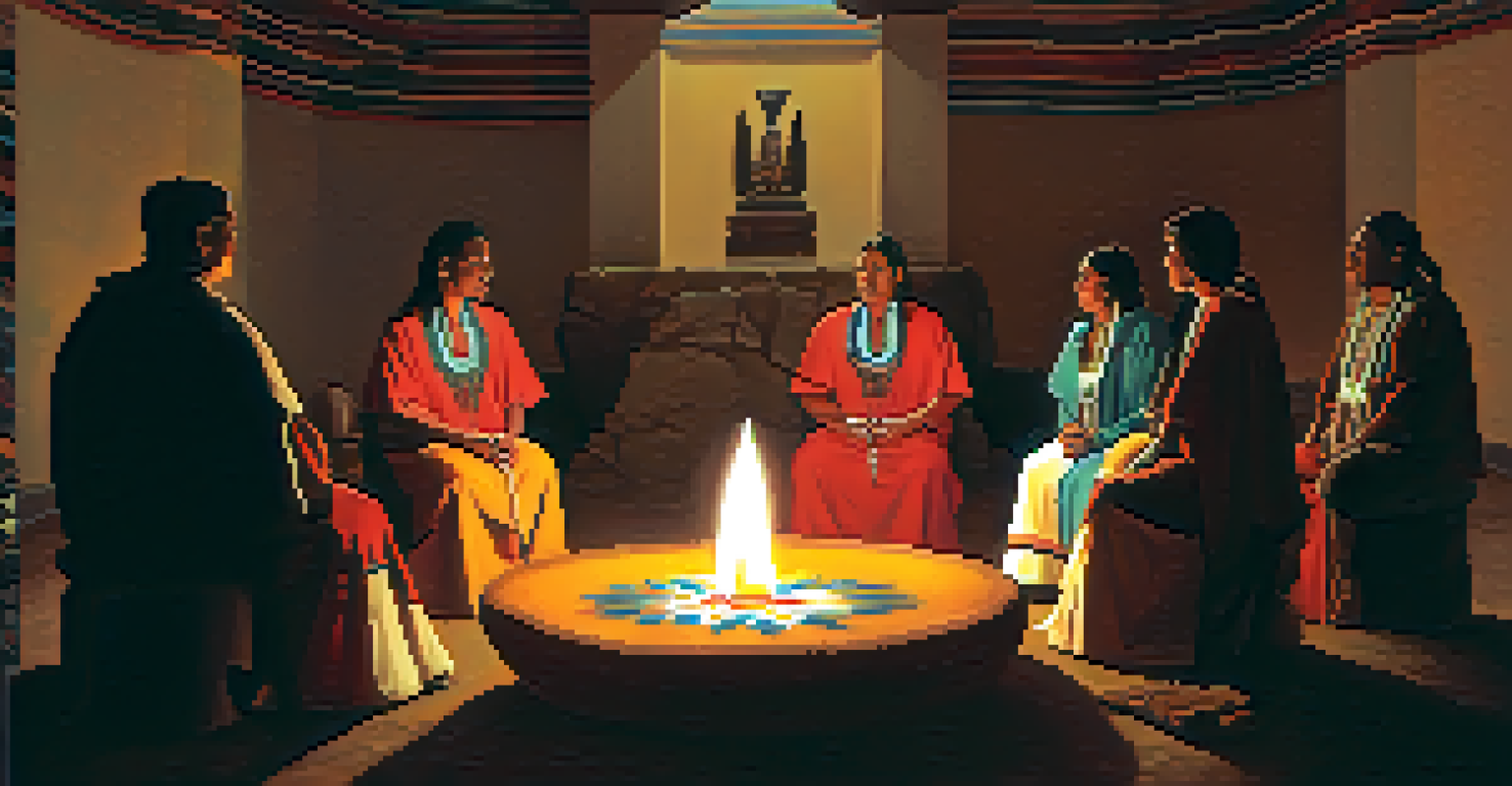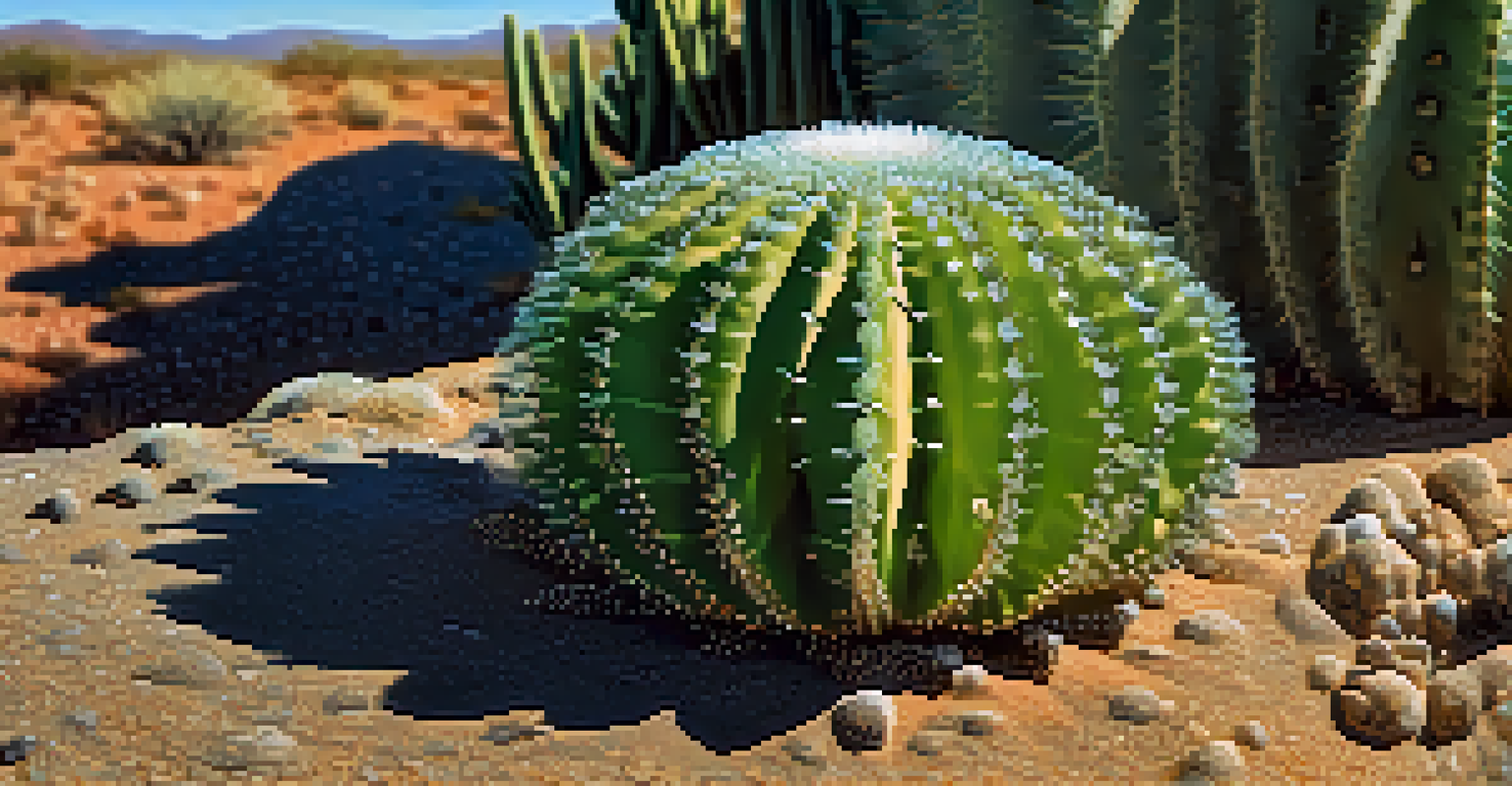Peyote as a Tool for Vision Quest in Native American Practices

Understanding Peyote: Nature's Psychedelic Cactus
Peyote, a small cactus native to Mexico and the southwestern United States, is known for its psychoactive properties. This fascinating plant contains mescaline, a compound that alters perception and consciousness. For centuries, indigenous peoples have revered peyote, not just as a plant but as a sacred ally in their spiritual practices.
Psychedelics can help us reconnect with nature, ourselves, and each other.
The use of peyote is deeply embedded in various Native American cultures, where it serves as a bridge between the material and spiritual worlds. It's not merely about the psychoactive effects; it's about the insights and revelations that can arise during the experience. This connection makes peyote an integral part of many ceremonial practices.
Peyote's significance extends beyond individual experiences; it fosters community bonding. When used in group ceremonies, participants often report shared visions and a sense of unity that strengthens their cultural identity. This collective aspect highlights the importance of peyote in the spiritual lives of many Native American communities.
The Vision Quest: A Journey of Self-Discovery
A vision quest is a rite of passage that many Native American cultures embrace, marking significant transitions in life. It traditionally involves a period of fasting and solitude, allowing individuals to connect with their inner selves. The quest often culminates in a vision, which provides guidance and clarity for the next steps in life.

Incorporating peyote into a vision quest can enhance this journey significantly. The altered state of consciousness induced by peyote often aids in deep introspection and heightened awareness. Participants frequently report profound insights and connections to their ancestors or spiritual guides during these experiences.
Peyote's Role in Spiritual Practices
Peyote is revered in Native American cultures as a sacred ally that facilitates spiritual insights and community bonding.
However, it's important to note that a vision quest is not solely about the use of peyote. The plant serves as a tool, but the journey itself requires preparation, intention, and respect. The combination of personal reflection and peyote's effects can lead to transformative experiences that resonate for years to come.
Sacred Rituals Surrounding Peyote Use
The use of peyote in Native American traditions is steeped in ritual and respect. Ceremonies often involve prayers, songs, and offerings, creating a sacred space for participants. These rituals are designed to honor the plant and the spirits that guide the journey, ensuring a respectful approach to its use.
The rituals of the Native American Church are not just a path to healing but a way to connect with the divine.
In many tribes, the peyote ceremony, known as the Peyote Way, is conducted by a skilled leader who guides participants through the process. This leader, often referred to as a 'roadman', ensures that the experience is safe and meaningful. Their role is crucial in maintaining the integrity of the ceremony and supporting individuals on their journeys.
Additionally, these rituals often include communal sharing at the end, where participants reflect on their experiences. This sharing fosters a sense of community and collective healing, reinforcing the bonds among participants. The rituals surrounding peyote use illustrate the deep respect and spiritual significance attributed to the plant.
Healing and Peyote: A Path to Restoration
Peyote is often recognized for its potential healing properties, both physical and spiritual. Many individuals turn to peyote as a means of coping with trauma, addiction, or psychological distress. The insights gained during peyote ceremonies can lead to profound shifts in perspective, offering new ways to approach personal challenges.
Moreover, indigenous healing practices often incorporate peyote to address community-wide issues, such as addiction or loss. By coming together in ceremony, participants can share their burdens and support each other in the healing process. This communal aspect of healing emphasizes the interconnectedness of individuals within their communities.
Vision Quests Enhance Self-Discovery
Incorporating peyote into vision quests can deepen introspection and provide guidance during significant life transitions.
However, healing through peyote is not a one-size-fits-all solution. Each individual's experience is unique, and the journey can be both enlightening and challenging. It's essential to approach peyote with care, respect, and an understanding of its potential effects on mental health.
Cultural Significance of Peyote in Native American Identity
Peyote plays a crucial role in shaping Native American identity, serving as a symbol of resistance and resilience. For many communities, the use of peyote is not just a spiritual practice; it represents a connection to their ancestors and cultural heritage. This deep-rooted significance helps preserve traditions that have been passed down through generations.
The legal and cultural battles surrounding peyote use highlight its importance in contemporary Native American life. Many tribes advocate for the right to use peyote in their ceremonies, viewing it as a vital aspect of their cultural identity. This struggle reflects a broader fight for recognition and respect for indigenous practices.
Additionally, peyote serves as a unifying element among various tribes, fostering a sense of solidarity in the face of adversity. Through shared ceremonies and experiences, diverse groups come together, reinforcing their common heritage and strengthening their cultural ties.
Modern Perspectives on Peyote and Vision Quests
As interest in indigenous practices grows, more people are exploring peyote and vision quests. This curiosity often stems from a desire for spiritual growth and self-discovery. However, it's crucial to approach these practices with respect and understanding, acknowledging their sacred nature and cultural significance.
Many modern seekers are drawn to peyote for its potential to facilitate deep introspection and connection to nature. However, engaging in these practices without proper guidance can lead to misunderstandings and cultural appropriation. It's essential to seek out authentic experiences and respect the traditions from which they originate.
Ethics and Cultural Respect Matter
Engaging with peyote requires a respectful understanding of its cultural significance to avoid appropriation and ensure sustainability.
Moreover, the conversation around peyote is evolving, with discussions on sustainability and ethical sourcing becoming increasingly important. As more people engage with peyote, ensuring the plant's preservation and the integrity of its cultural use is paramount for future generations.
Ethical Considerations in Peyote Use
With the growing interest in peyote, ethical considerations surrounding its use have come to the forefront. Many indigenous communities express concern about the commercialization and appropriation of their sacred practices. It's essential for seekers to approach peyote with humility and a willingness to learn from those who have historically used it.
Understanding the cultural context of peyote is crucial for respectful engagement. Engaging with indigenous leaders and participating in ceremonies with permission can foster a deeper understanding of the plant's significance. This respectful approach can lead to transformative experiences while honoring the traditions that have safeguarded peyote for centuries.

Additionally, conversations about the future of peyote often center on sustainability and conservation. As demand for peyote increases, protecting its natural habitats becomes essential. Ethical use of peyote involves not only respecting its cultural significance but also ensuring its availability for future generations.